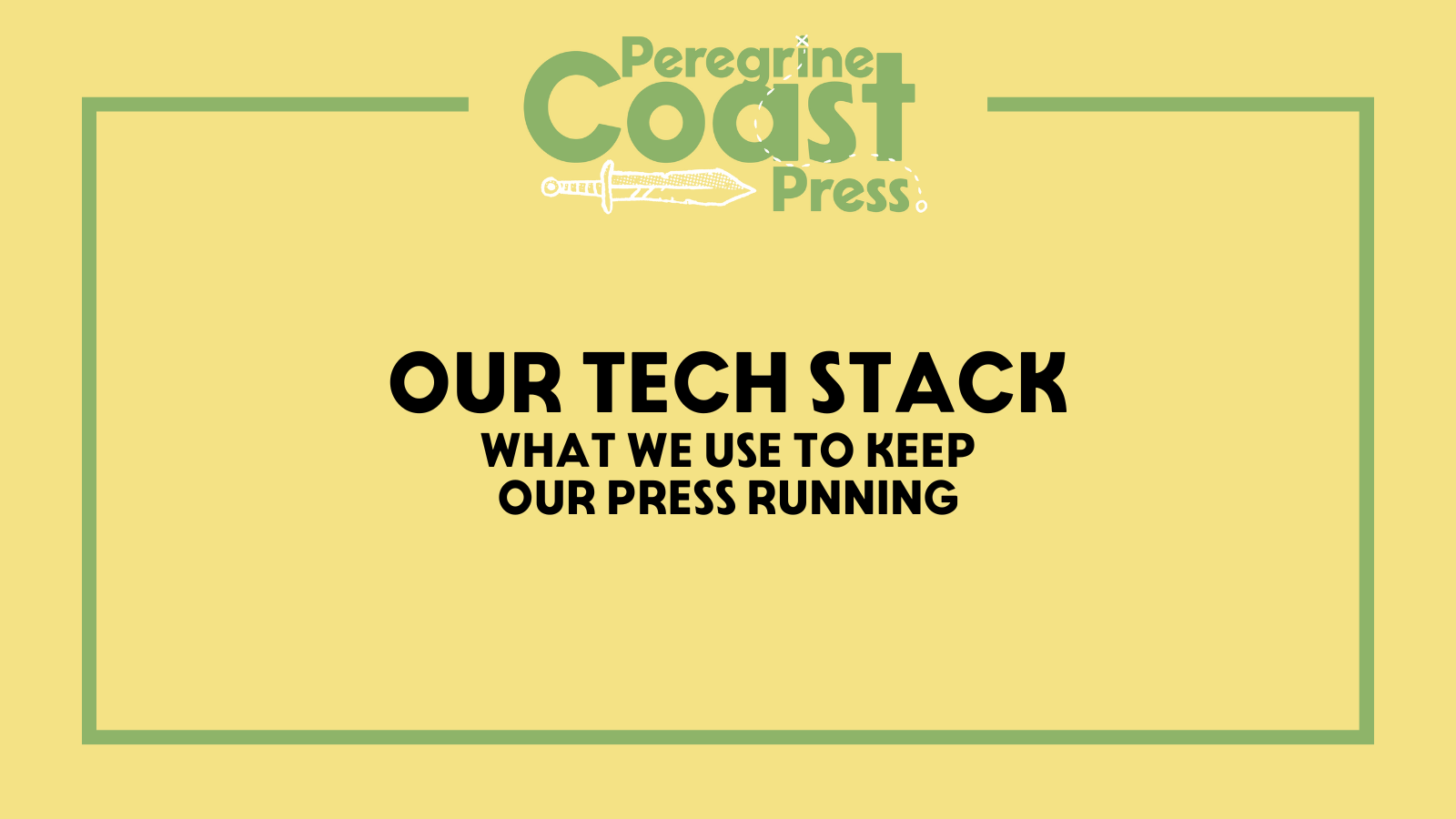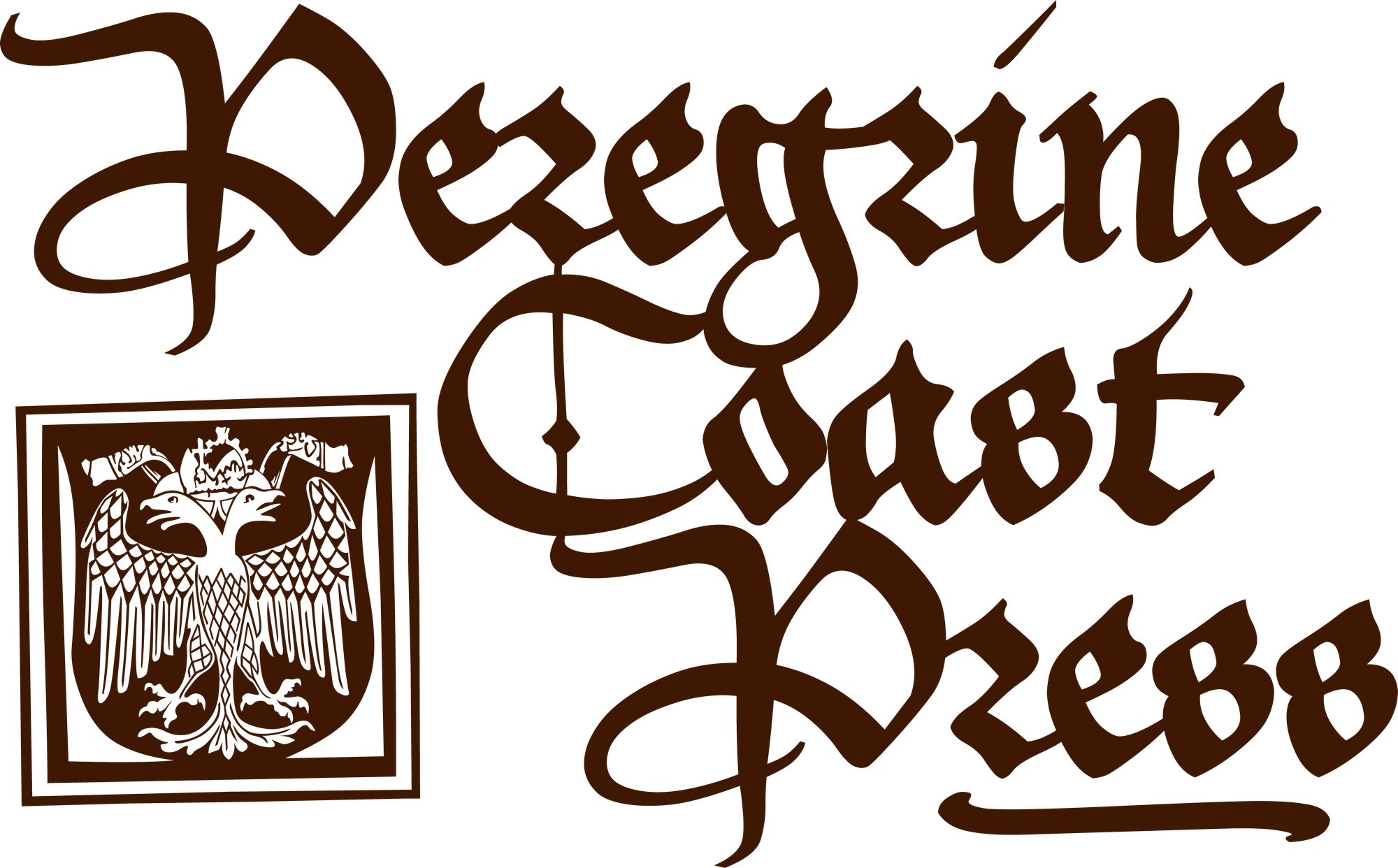The Tech We Use as an Independent Press
How do we keep our independent press running? Eryk talks about the tech we use that keeps us organized and on track for all of our projects!

Calling it a “tech stack” is a bit silly, but I’ve been working at tech startups for the past few years and I like to pretend that our little analogue game publishing co-op is actually mega ✨resilient✨ and advanced.
We use a lot of tech in our day-to-day of running the Press with three main goals:
- Reducing the *manual* bookkeeping we have to do. Manual is a key word here; bookkeeping is a fact of life, but it’s pretty boring and I don’t like having to do a lot of it when I could be spending my time working on our creative projects.
- Enabling asynchronous work. There’s four of us at PCP right now, all working day jobs and split across two different time zones. The time we have to work on the Press isn’t set in stone (we work regular day job 9-5s), so we have to make sure that the limited time we do have is spent efficiently.
- Owning our data. I’m a big believer in the TTRPG space’s move away from Kickstarter and I want the Press to not be beholden to the whims of big tech corporations. Where possible, the software we use is either open source, free, or easily transferable. The ones that aren’t are, unfortunately, the cost of doing business, so to speak.
Let’s start with the baseline: communications.
Discord
Discord is actually not a solved issue (at least for me), because it’s mostly a chat app and things get missed easily. Nevertheless, we use Threads in a #proposals channel which keeps conversations segmented and all of our discussions are out in the open.
We tend to let folks get on with the work they’re best at and really lean into the “no bosses” approach of a co-op, so we don’t vote on things as much as one would think. We trust everyone to make decisions that have the co-op’s interests at heart, and by nature of all conversations being out in the open for everyone to see, we tend to chime in on conversations as and when. A good example of this is our stock-buying process: I have my ear to the ground on a lot of indie RPGs and can suggest what to buy there — Syd and Harry might have more ideas on which books and literary works to stock.
Linear
Linear is a project management tool for developers (again with the startup tools 🤷♂️). We’ve wrestled with Linear to make it work for us though, to be fair, project management principles are pretty universal no matter the industry you’re in.
The main benefit of Linear is its Discord integration: if, for example, I’m away from my desk and the others need something from me, they can just type `/linear new` into Discord and pop a new to-do into my inbox. This goes some of the way towards important stuff getting lost in the noise: the Linear task comes with a link to the message that I can click to get more context on what it is the others need me to do.
Linear also allows us to assign to-do’s to Projects, assign them estimates of “Effort Required”, create sub-tasks for blockers, and post project updates that communicate to everyone how well a project is going. And, the effort estimates allow us to see how much work everyone has on their plates at any one time. I’m a fan!
I also combined Linear with Zapier - Zapier allows two pieces of software to interact - to automatically import certain emails into my Linear inbox. I set up a filter in Gmail that tags everything that goes to our invoices@peregrinecoast.press email with the “invoices” tag. Everything with the “invoices” tag then gets imported into Linear through Zapier, including attachments, the subject line, the sender, and a link to the email itself. This means I can open up Linear when I’ve got some free time, see an outstanding invoice, and get it paid without having to leave Linear. I’ve done the same with a “to-do” tag in Gmail - some emails require actions, some don’t, and it’s easy for those to get lost in the noise when you receive a lot of emails.
It’s quite an opinionated piece of software, which I’ve found I prefer to something like Notion which really lets you loose. I find that overwhelming, and the upkeep of Notion databases really requires everyone to be on the same page which can be a bit of a task. With Linear, there’s only one way to do things.
Ghost
We use Ghost to host our newsletters and website. Ghost is an open-source Patreon alternative, though we pay for their Pro plan to delegate the headache of hosting an instance ourselves. We make that decision a few times throughout: there are things we could do ourselves, but paying someone else to worry about it works out cheaper than if we factored in the time we’d have to spend doing it ourselves.
Ghost is pretty ace in that it allows us to send out newsletters and post them as blog posts simultaneously. We made the decision to combine our newsletters and blog posts so that we’re not making extra work for ourselves, and actually asking: is what we’re putting out of use to folks?
On top of all that, Ghost allows us to take recurring subscriptions from folks who might want to support the Press financially, and it allows us to send out paywalled emails (not that we’ve done that yet, but we might start creating paywalled stuff in the future).
To stay independent of Ghost, I also have a Zapier integration that automatically syncs the mailing list with Mailchimp, both ways. Folks who sign up through the Press’ homepage get synced to Mailchimp, and folks who sign up through our Shopify shop (using the Mailchimp integration), get synced to Ghost. We essentially have two backups of our mailing list going at once.
Shopify
Not much to be said on Shopify, all-in-all. It’s expensive, it’s kinda slow, it’s only compatible with proprietary hardware and yet it’s still better than most of the other ecommerce solutions out there.
We treat Shopify as our source of truth for stock levels right now: incoming stock from creators is set up as a Transfer which Hugh can see. The transfer includes tracking data and stock numbers so he knows what to expect and when to expect it. When it arrives, he can count it all and it to our shop’s available stock with the click of a button. We also do this when moving stock between members of PCP - Harry’s been in charge of beautifying our shop recently, so we created a transfer which tracked items he needed. The stock is accounted for in our system, but unavailable for purchase so we don’t accidentally oversell.
I tried WooCommerce and Wordpress in the past (both Unexplained Scotland and Transmission For Them were crowdfunded using WooCommerce!) but that was even slower. Getting any sort of functionality out of it mostly required expensive monthly plugins or custom code which made it a really painful experience.
It’s quite likely that we’ll pay a front-end developer to hack a variation of the Craigstarter idea into our shop at some point in the future. We’ll likely rely on Kickstarter for a while yet, but I’m also hoping we’ll manage to fund some other projects independently, on our own website.
Why we stopped using Notion
I called Linear an “opinionated” piece of software earlier. That’s because it adheres pretty strongly to the Agile methodology of project management - there are tasks, those tasks get assigned to cycles, cycles repeat every two weeks, and everyone is aligned on what everyone’s working on. Notion is a playground: every feature can be used with another feature, and its databases can be displayed in a plethora of ways, with a simple file directory system. If you need to take a note, Notion will let you open a new document really quickly. From there, placing it, formatting it, and so on is up to you. It’s pretty unopinionated in how it lets you do things.
Unfortunately, a lot of Notion’s features are nice, but they don’t compare against purpose-built software. It lacks Google Docs’ change tracking (which is really important for Syd, who works with our writers and edits our work), it lacks the depth of Google Sheets (which I use to budget), and so on.
Gitbook
So, to go towards more opinionated pieces of software, we’re testing out Gitbook to replace Notion as our hub for documentation. The nice thing about Gitbook is that it’s really easy to create public-facing documentation (we’re already using it for https://docs.peregrinecoast.press) and it syncs to GitHub. We can use GitHub for version tracking (which can also be made public, which is handy for keeping us accountable) and to take suggestions from people who might be interested in helping out.
Airtable
This is one we’re (Hugh) working on implementing right now. Airtable is a programmable database, so we’re looking to automate a few of the really manual workflows Hugh has going on right now when handling our fulfilment work. Most of them revolve around emails: receiving consignments from people, handling crowdfunding backer addresses, counting stock for folks, and so on. The strength of Airtable is in being able to set up client-facing pages where they can upload data themselves, databases where we can pull in tracking data from Royal Mail (and our other courier services) and surface that data to those same clients. It should eliminate a lot of email threads which fill up our fulfilment inbox right now.
Xero
Xero is our accounting tool so I don’t know if anyone would find this interesting. It keeps track of our income, spend, and we use it to invoice folks for B2B work. It’s the source of truth for our balance sheet: it shows us every transaction we make and receive through integrations to our Stripe account and our bank accounts.
Summary
Typing all of this up makes it sound like a lot. It is a lot, but we’re a small, as-of-yet unprofitable business so we all have to wear lots of hats. This might not be how we do things in the future (royalties are a big problem we’ve not sorted yet, which we really do need to sort once the number of projects we publish increases), and we didn’t start off with all of these tools. God knows if you’ve sent me an email in the last 4 weeks I’ve probably taken a long time to get back to you, but the Gmail>Zapier>Linear integration is the reason I got back to you.
Keeping this going is cheaper than you’d think (for a business, mind, not necessarily if you’re an individual): Linear has a free tier. Gitbook has a free tier (but we’re going to pay for it once our free trial of Notion runs out). We paid for 2 years of Shopify in one go to lower the monthly price. Airtable is $25 a month. Discord is free. There are ways to make these things attainable on a budget and the time taken to learn them pays dividends in the time you’ll save further down the line.
I love chatting about this stuff so feel free to shoot over any questions you have or if you wanna nerd out over software in need of problems to solve :)
